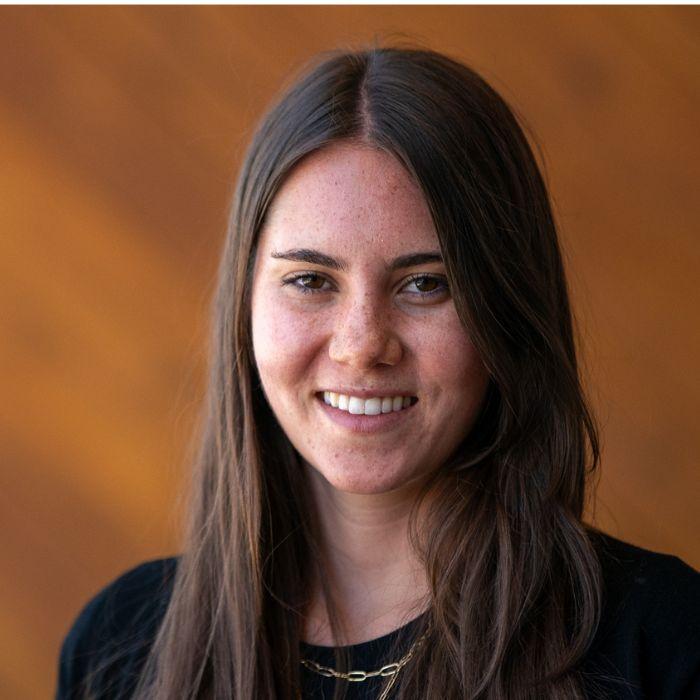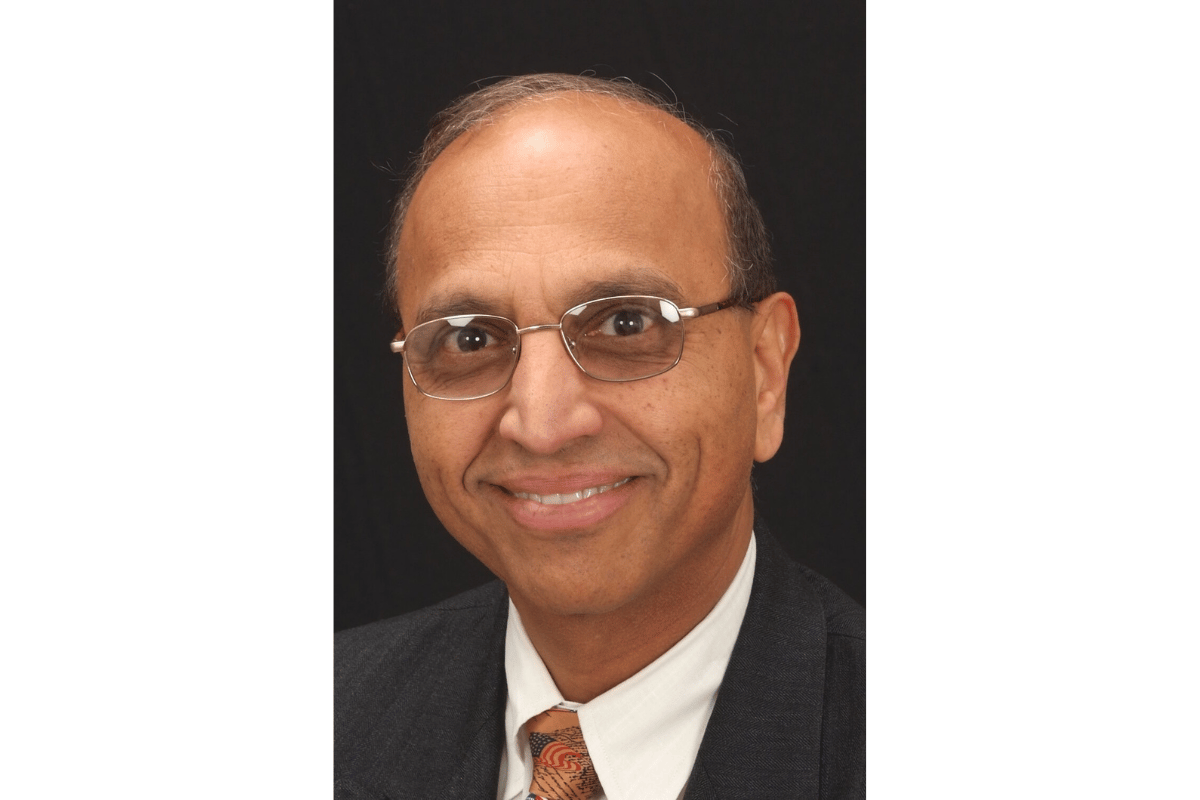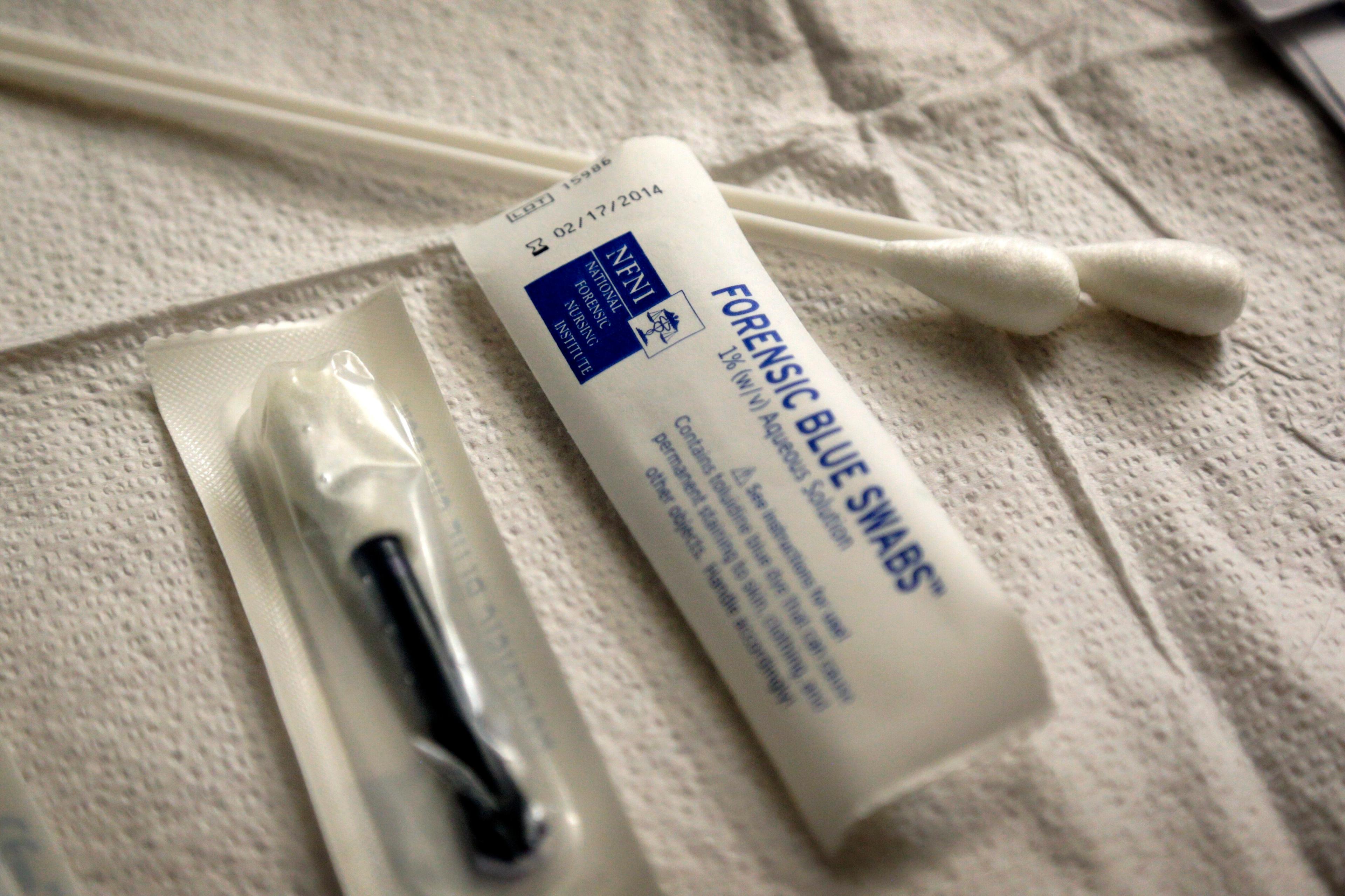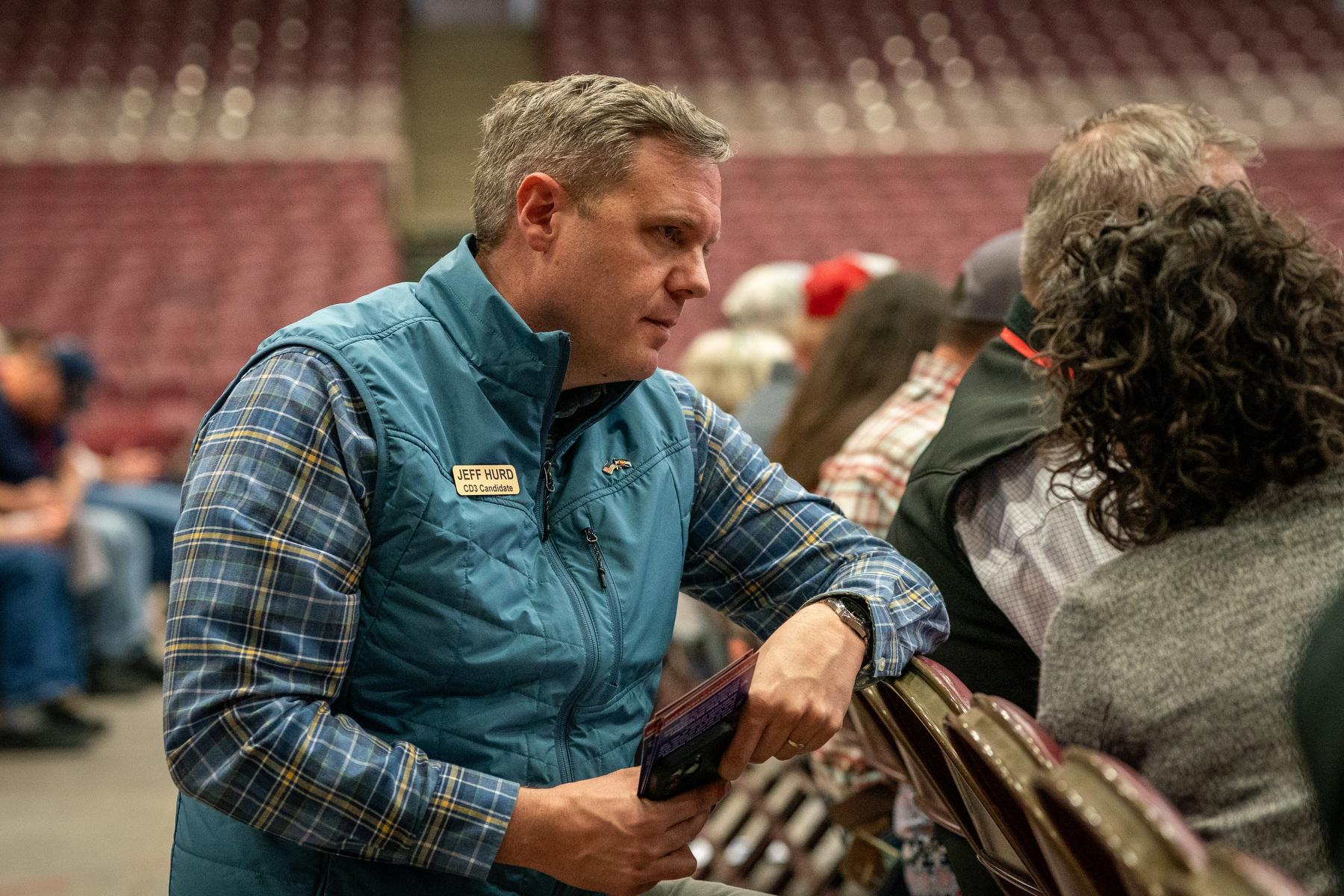
The Republican candidate vying to represent Colorado’s expansive 3rd Congressional District is unlikely to draw the volume of headlines that residents in western and southern Colorado have come to expect from the region’s outgoing member of Congress.
Jeff Hurd, a Grand Junction attorney, handily won the Republican primary in June, taking over the slot that could have been Lauren Boebert’s, had she chosen to stay in the district. Hurd entered the race as an alternative to Boebert, racking up early endorsements and cruising to the nomination after she left to run in another district.
In a conversation with Colorado Matters, Hurd said “I'm principled, but I'm also pragmatic.”
The father of five says regulations have pushed coal plants in the state to close unnecessarily, hurting local economies, and that the district’s top export is now its children, who have to leave for economic opportunities elsewhere.
“What I tell my Democratic friends,” Hurd said, “is if you genuinely care about reducing global greenhouse gas emissions, then you ought to support getting as much energy out of Colorado as possible.”
Hurd says he’s pro-life, but would not support a national abortion ban and thinks the issue should be handled at the state level. Ahead of his race with Democrat Adam Frisch, Hurd spoke with Colorado Matters about energy, abortion and his personal connection with immigration.
This interview has been edited for length and clarity
Ryan Warner: I'd like you to name a problem in your community and explain why voters should send you to DC to address it.
Hurd: Well, I think energy is one of the problems in our community and the cost of living, cost of groceries is tied to that. So we need a policy. We need somebody in Washington who will advance a thoughtful energy policy that helps create jobs for energy families that are in Western and Southern Colorado, helps with good jobs that support strong families and strong communities, but that also helps promote abundant, low-cost energy that helps all of us from the cost of our groceries to the cost of our gas to the cost of our houses as well. Energy sort of operates as a hidden tax on all those things.
Warner: By way of background, you're an attorney and you work with electric cooperatives?
Hurd: That's correct.
Warner: As we record this, President Biden is unveiling a new round of clean energy funding for rural electric co-ops. This is through the Inflation Reduction Act. Two co-ops with a presence in Colorado, including Tri-state Generation, which operates in Craig, are receiving some of this $8 billion investment meant to fill in the gap left by the retirement of coal-fired plants, which is no doubt an issue in your district. Has the Inflation Reduction Act been beneficial in your mind?
Hurd: Well, I think it's responding to a problem that needn't be there, which is taking reliable, affordable, energy-efficient generation offline, baseload generation offline. But this is the situation that we're living in, Ryan. And with the Inflation Reduction Act out there and the funding that's available, I think it's the responsible thing for generation and transmission cooperatives, like Tri-State, that you mentioned. And I think it's incumbent on them, given the situation right now in our energy economy, to use available funding to advance projects that help rural citizens keep their energy costs low. And there are opportunities in the Inflation Reduction Act for that.
Warner: When you said earlier that we have taken baseload energy offline, are you making a reference there to coal, which has largely been affected not by policy, but by market forces? Natural gas, according to Stanford, for instance, just made coal no longer economically viable. And at the same time, solar and wind have made significant inroads.
Hurd: I'm not sure I'd agree with that premise there, Ryan. I think if you talk to the folks up in Moffat County at the Craig Power Station where they're being shut down, I think that was an economically viable project, and that's a coal-fired power plant that creates a heck of a lot of good jobs, not only for the power plant workers but also for the miners that are mining that coal up there, which by the way, is some of the highest BTU, lowest mercury, lowest sulfur coal in the world.
I think the reason that power plant is being closed is not because of larger economic reasons, but regulations here in the State of Colorado that are requiring reductions in greenhouse gas emissions. Same thing as Comanche 3 in Pueblo. I think it would be really hard-pressed for somebody to say that we are going to take that economic generating unit offline, which has decades left in its life. It's already built, it's already producing power, low-cost, reliable (power). I think it would be hard-pressed for anybody to say it's for economic reasons, entirely, that we're taking those facilities offline.
Warner: Another serious problem faces Colorado, which is climate change. And it has warmed the Western slope faster than the global average. The Washington Post called your region one of the largest hotspots in the Lower 48. There are some Republicans who dismiss global warming as a hoax. Are you among them? Do you agree with them?
Hurd: No, I don't. I do believe climate change is real and I do believe it presents challenges. I know that here in the Western Slope, for example, where I'm from, and at home, and where I'm raising my kids, we do have a changing hydrology and the climate is drying. And we need to make sure that whatever we're doing to address this issue takes into account that it is a global issue and there are emissions that are coming from other countries that have a much higher carbon intensity than what we're doing in Colorado.
And what I tell my Democratic friends, Ryan, is if you genuinely care about reducing global greenhouse gas emissions, then you ought to support getting as much energy out of Colorado as possible. That includes not only the clean coal that we have, but also natural gas. Nuclear is another thing that we need to be thinking about as well. And I think we need to make sure that we are doing everything we can not just to focus on wind and solar. I think those are good. I am a little bit concerned if the government is putting its thumb too much on the scale in favor of those technologies while disadvantaging the more traditional carbon-based energy resources.
Warner: Well, it seems that this administration, the Biden administration, is going full speed ahead on both. I mean, oil production hit a record, for instance, under Biden. What would you change? You've talked about a thoughtful energy policy. You've acknowledged that climate change is real. What would you pursue as a member of Congress, before we move to the next topic?
Hurd: Sure, Ryan. Well, the first thing I can think of is lifting the Biden administration's ban on the construction of LNG terminal exports. I think that that is bad economic policy, it's bad environmental policy. If you want to lower global greenhouse gas emissions, we need to get as much of that natural gas out of the United States as possible.
Warner: Let me just say — LNG, liquefied natural gas.
Hurd: Liquid natural gas. That's right, yes. Sorry about that. A little bit of inside lingo there. Yes. Liquefied natural gas terminals. That ban on those new facilities. We need to get our gas out to our allies in Asia, like Japan. We need to get our gas out to our allies, like in Europe. I mean, we saw after the Russian invasion of Ukraine, the cutoff of supply of Russian gas, and we had European countries like Germany bringing old coal generation back online. I would love it if, instead of that coal generation and having to bring those facilities back online, they were able to use natural gas from the United States.
Warner: I'd like to talk about some social issues. So the Life at Conception Act would extend equal protection for a right to life to embryos, all the way to fertilized eggs. More than 100 Republicans have signed on in the US House, including the speaker. It could mean the end of IVF treatments and a functional ban on abortions. Speaker of the House Mike Johnson calls you and asks for your vote, if you're elected, on the Life at Conception Act. What do you say?
Hurd: I'm going to say, "I'm sorry, Mr. Speaker, but I'm not with you on this one." I understand that this issue is really complex and sensitive, and I know that my friends — I have lots of good friends on both sides of this issue, pro-choice and pro-life. And what I tell my pro-choice friends that are unhappy with me because I'm pro-life, but I also have a bunch of pro-life friends who are unhappy with me because I believe in exceptions and because I also believe this is an issue that should be primarily left to the states.
When it comes to IVF as well, I have lots of good friends and even members of my team who are able to have children because of IVF, and that's also something that I would not support a ban on IVF treatment. I don't think that that is something that is pro-family. I don't think it's consistent with my values as somebody that's trying to help families grow, and thrive, and succeed.
Warner: I gather, then, that you'd be a no as well on a national abortion ban?
Hurd: I would be a no on a national abortion ban. I believe this issue should generally be left to the states. That's correct, Ryan.
Warner: And yet, one state's decision can become another state's issue. I want you to hear these numbers from the Guttmacher Institute. In 2023, 4,400 Texans came to Colorado for abortion care, 280 from Wyoming, 370 from Oklahoma, 170 from South Dakota, 100 from Louisiana. So is this truly a state's issue? Does this stop at a border?
Hurd: That's perfectly acceptable, as far as I'm concerned. Those states have decided things in ways, by the way, that I don't necessarily agree with. I think some of those abortion laws are Draconian, and they're wrong, and they're not advancing women's health. I think it's important for those women and families to be able to receive, if they need, that care here in Colorado. And so, I would be strongly opposed to any sort of ban on letting people travel interstate.
There's a constitutional issue, also, that I think would be implicated if somehow we try to prevent citizens from traveling to other states for these reasons. I'm not sure it's the government's business to be involved in that. I think that's part of what you have in a federalist system, Ryan, is people moving to places and traveling to places based on what different public policy decisions that state has made. So that's the way it's always worked in America, and I'm not surprised to hear those study results from the Guttmacher Institute.
Warner: But doesn't that favor wealthy people? In other words, you've got to have the money to travel for care, you've got to have the time off of work. Isn't that creating an unfair system of care, an uneven system?
Hurd: I'm not sure that I would single out abortion any differently than health care that you get for medical reasons that are not related to reproductive health. Yes, it is true that those who are financially well off, they have a broader range of choices than others. My view is we need to be trying to lift up everybody and help families that are poor get jobs that allow them to support their families and be able to, not just for abortion, but for other reasons, travel outside of their state.
I mean, there's a broader issue of rural health care and access to health care here in the state that I think really matters. And I think one of the ways that we can help rural Coloradans in particular, which are the folks that I'm seeking to represent in Congress, is by making sure that we have appropriate access to rural health care here in Colorado. And that's comprehensive care. It's not just primary care, but it's also dental care, mental health care. And I'll tell you, Ryan, having been campaigning for more than a year, I hear very little about abortion except from reporters, I will tell you. But, I hear mostly about health care here in Colorado.
Warner: To immigration, I just want to note, Barbora, your wife, is from Czechoslovakia. She's a naturalized citizen.
Hurd: Correct.
Warner: And I wonder how her experience, if you're comfortable talking about it, and how your experience as her husband, how has that shaped your view of immigration?
Hurd: That is true. She's originally from communist Czechoslovakia. I will tell you that, through her eyes, I've come to see our country on a level that I never would've imagined. When I saw her take the citizenship oath, she started to cry. Those are some pretty serious words. I had never really heard it. I had never been to a naturalization ceremony. And so, when she was taking the oath of allegiance to the United States, she started to cry, and I had a huge lump in my throat, I'll tell you, Ryan. And so, it really brought home what it means to be an American and how we really truly are a nation of immigrants.
Just like my wife, she sometimes is a little bit self-conscious about her accent, and I tell her that it's something to be really proud of, that she is part of the fabric of what makes America such a special country. But my perspective is informed by the view that we are also a nation of laws. And so, yes, I am very pro-immigrant, very pro-immigration, but I'm also in favor of doing so in a way that makes sense, that provides for national security, that provides for economic security, that we know who's in our country, and that the people who become citizens, like Barbora, my wife, affirmatively agree with those principles and they buy into what it means to be an American citizen. I think I'm in favor of a robust, thoughtful immigration policy.
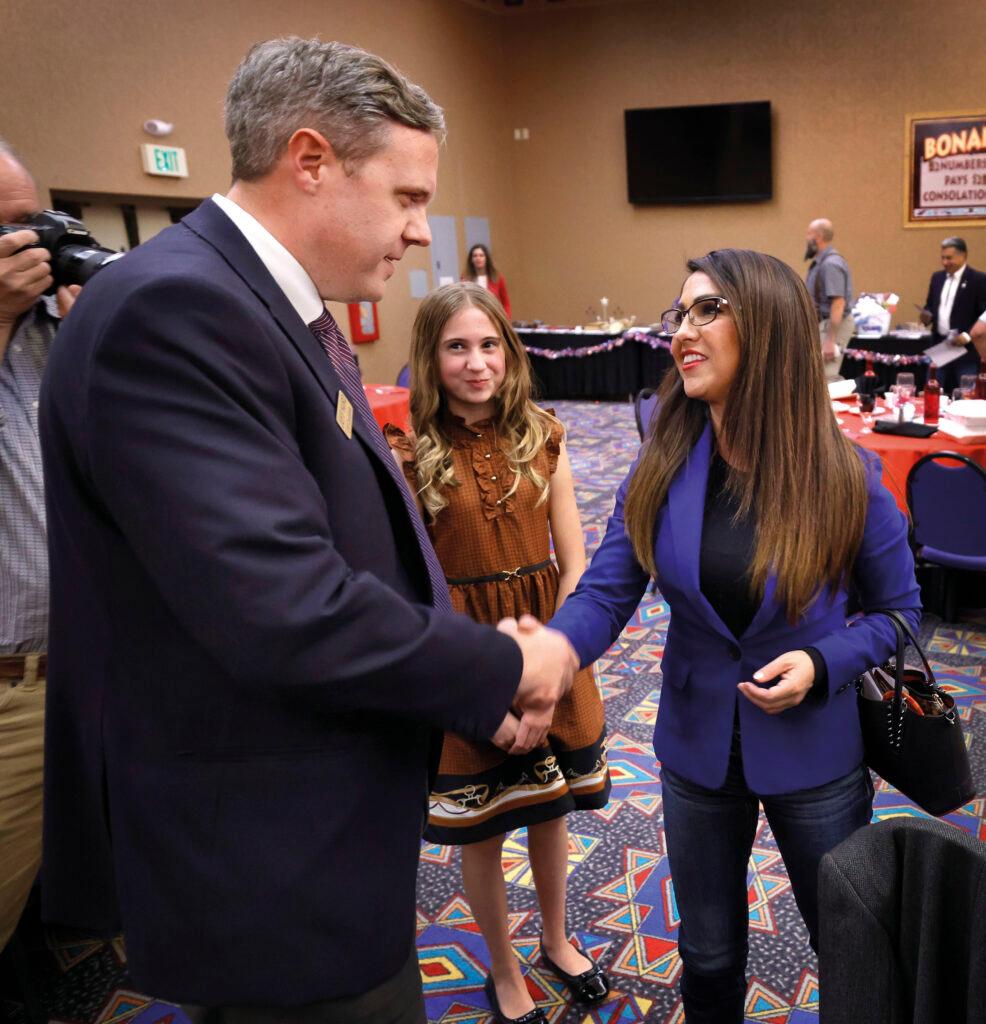
Warner: Republicans took heat earlier this year for voting against an immigration bill authored by one of the most conservative members of the US Senate, and it was reported that they killed the bill so Donald Trump could run on immigration. Would you have voted for that bill?
Hurd: I think it's unfortunate that that bill wasn't allowed to go through the legislative process. I'm not privy to all the reasons that were behind it. But Ryan, I think that's the sort of thing that we need to be looking at. I certainly would have pushed hard for amendments to the bill. It's not a perfect bill by any means. But one of the things that I'm going to try to do when I'm in Congress is not make the perfect, the enemy of the good. Yes, I'm principled, but I'm also pragmatic.
I'm hopeful that this issue of immigration is not off the table, that regardless of who becomes president, we will have this discussion and that we will pass legislation that makes sense, that secures the border, that reforms our asylum system, which is badly broken, that adequately funds border patrol and law enforcement. And I hope and expect that that's something that we're going to be talking about, when you and I talk next year, hopefully, if I'm fortunate enough to be congressman, that we'll be discussing then.
Warner: Donald Trump is once again at the top of the Republican ticket. Will you be voting for him?
Hurd: So I don't talk about who I voted for, Ryan, just because that divides people into tribes. And one of the reasons I got into this race was because I felt like we were focused too much on national issues and not enough on local issues.
What I tell voters in this district, because President Trump is extremely popular here — he's going to win this district I think, pretty handily. And so I focus on issues, which is what I've consistently done. And I say to voters here that President Trump's top priorities, securing the border, energy independence, growing our economy, getting rid of bad regulations, those priorities are my priorities as well, and there will be no more effective advocate for me in Congress for those priorities when I'm in Congress.
Warner: Do you believe, I suppose the answer is no, but why are Trump's 34 felonies and his attempt to overturn an election his own people and court after court said was fair — those don't seem to be disqualifying for you.
Hurd: Well, I think when I look back at the people that I'm seeking to represent, I see them as feeling like they're not heard and that we have a politics that has forgotten people in rural Colorado, and they feel left out, and they feel that we have rule by people that are political elites who aren't in touch with the people here. And I know, for them, and there's some, I think, legitimate concerns about the prosecution that happened in New York specifically with Alvin Bragg, I think people here recognize that there are some cases that may be more politically motivated than others, and that the one in New York, I think, causes some justifiable concern from citizens here.
And so I think they see that as something that is not as relevant to the things that they really care about, which is the cost of groceries, the cost of gas, the cost to buy a home, needing health insurance for their families. And so, when they look at who they're voting for, I don't know that they're necessarily looking at the things that the political class and reporters are caring about. They're looking at things like, "Hey, am I going to have a job in the energy industry here in Colorado that lets me support my family? Or am I going to be like the coal miners in Craig and at the Craig Power Station who are losing their jobs because of bad policies that have been enacted by folks that tend to be in the Democratic Party?"
Warner: And that separate issue of January 6th, that's not disqualifying for you, what the president has said about the last election? I'll just note that's misinformation that has been boosted, for instance, by, there in Mesa County, former County Clerk Tina Peters. And meanwhile, we find the Justice Department saying that Russia has paid right-wing influencers in an attempt to sow division in the US. But this notion of saying that the election was stolen, the election's not fair, is that disqualifying? And what do you make of the mail-in system in Colorado?
Hurd: Well, I've been pretty clear on this, Ryan. I've been asked a number of times. I have not personally seen evidence of fraud in the 2020 election that, in my view, would've changed the results. And so, I'm direct when I'm asked that question, and that's my answer. When I talked to people here in Colorado, in my district, there are a lot of people that see things differently.
But ultimately, when they're looking at who to vote for in Congress, I think they're looking to see who's going to work hard to secure the border, who's going to advance a policy that helps energy in our economy, who's going to fight for Colorado water and for Colorado agriculture? And when people ask me why, what is it that makes me, what motivates me to want to run for this seat, I tell them that I feel as though rural Colorado is being left behind and that our greatest export are our kids. They grow up, and they leave, and they oftentimes don't come back. And I'm running because I want to create economic opportunities so that our families can, if they want, stay, and live, and thrive in Southern and Western Colorado.
Warner: That district is enormous, the 3rd. It includes two sovereign nations, the Ute Mountain Ute and Southern Ute Tribes. Have you visited those reservations?
Hurd: Your timing is really good, Ryan. I'm actually on my way. Yes, I have visited the reservations. But, later today, I am headed down to La Plata County, and I will be meeting with leadership, the tribal council, tribal leadership of the Southern Ute Tribe, and I'm looking forward to that. It's something I haven't done before, and I think it's an important thing to do. I know that as a sovereign nation, they have issues that are unique in the 3rd Congressional District. And I know that they are also burdened by federal regulations that make it harder for them to promote economic development.
And I've heard that issues like NEPA and federal regulations, the Endangered Species Act, are making it hard for them to promote their economies as well. And they have water project issues, infrastructure issues. Those are the things that I'm aware of, but I'm going to be going down to the Southern Ute Tribe to meet with tribal leadership, and I will be definitely in a listening mode, and I look forward to meeting with them and hearing the issues that matter most to them.
Warner: You mention NEPA, the National Environmental Policy Act. Should the Ute Tribes and should Colorado and other upper basin users expect to make some sacrifices to their water allocations, do you think?
Hurd: I'm not sure. By sacrifices, I don't think that the tribes should have to give up any of their rights, particularly under the 1922 Colorado River Compact. One of the criticisms that I've heard, and I think it's fair, is that the tribes are oftentimes not at the table when it comes to these water decisions that are being made. And I know that the 1922 Colorado River Compact mentions the tribes.
I think it's important that we include them in those discussions. I was actually at Colorado Water Congress a week ago or two weeks ago in Colorado Springs, and I was fortunate enough to be able to address them on water issues. But there was also a very interesting presentation from the tribes on water, and water infrastructure, and how we need to make sure that they are included in those discussions. It's critical. They are every bit as important as any other citizen here in our state.
Warner: In just the last minute or so that we have here, the Heritage Foundation is a longtime player in conservative politics. They helped create something called Project 2025 with help from at least 140 people who worked for President Trump. The former president has tried to distance himself from the project, particularly its more unpopular elements, like restricting access to abortion medication. It would also make cuts to Medicaid, eliminate the Department of Education, shrink the National Weather Service so there's less talk of climate change. Would Project 2025 guide your lawmaking?
Hurd: I think, first, it's a gigantic document. I haven't read it. I think it's over 900 pages, and there is a ton of stuff in that document. I've heard some of the ideas there that I think are worth considering. Others, not so good. I view it more as a menu of options when it comes to public policymaking. I think it would depend on the specific policy or proposal.
Warner: Is there one you want to name that you like?
Hurd: Yes, one of them about public lands. There's some material that I've seen in there. One of the issues that we're having here is with public land management, but specifically the designation of national monuments under the Antiquities Act of 1906. That's a discussion that we're having here in Western Colorado with the potential designation of the Dolores Canyon National Monument.
I think making sure that we have local buy-in before we have monument designations is something that I think is critical and that is consistent with certainly the intent of the Antiquities Act of 1906. I'm sure there are some others in there that would be worth considering, but again, there are going to be a lot of policy proposals in Project 2025 that I just would not be able to support.


